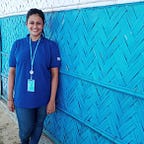How WFP is changing lives during the time of COVID-19
In Bangladesh, the World Food Programme (WFP) is working to ensure the refugees living in the camps can still access essential food and nutrition assistance amidst the pandemic.
Before COVID-19, if you had come to the nutrition center in Cox’s Bazar, Bangladesh, home to the world’s biggest refugee camp, you would have been greeted with happy children, smiling and playing.
Whereas now, adjustments had to be made to ensure that children coming to the centers are protected from the virus. Only 15–20 children and adults are now allowed to visit, with one hour apart from the next group, so that social distance can be maintained.
Inside the centers, there are handwashing facilities for people to wash their hands. The volunteers working there make sure that everyone washes their hands before the activities start, and they sit at least 1 meter apart from one another.
Only two months ago, the scenario was quite different. WFP distributed deworming tablets across all the then functional 51 nutrition centers throughout February. The campaign was operating alongside the regular programs. The families could come to collect their regular nutrition items and could also get deworming tablets for their children.
WFP runs a number of programs to prevent acute malnutrition and moderate malnutrition. WFP mainly caters to two types of target population: children under the age of five, and pregnant and breastfeeding women. The programs provide Ready to Use Supplementary Food (RUSF) Plumpy Sup, Super Cereals, and Super Cereal Plus.
The distribution system has altered significantly due to the recent COVID-19 crisis. ‘Double ration’ system will ensure that the beneficiaries are receiving a two-month ration to reduce the number of visits to the nutrition centers. Going forward, from June, the super cereals will be merged with the e-voucher items to prevent families from visiting the centers frequently.
Extensive precautionary measures are already being adopted to prevent and reduce any transmission of COVID-19. Different awareness sessions are being held for beneficiaries on the best practices of COVID-19. Handwashing techniques, cleanliness, and social distancing etiquette are being conveyed on a regular basis.
Kala Banu is 6 months pregnant and came to the nutrition center to collect the super cereal. “I know what I get from here is super important. I have started coming here regularly though today I am told I can take the super cereal for the entire two months.”. Other than taking the super cereals, when asked if she is taking any extra measures to be cautious in this period, she said, “When situation outside is not so good, I know I have to extra careful.”
Much like Kala Banu, Hasan Miyan also came with his son to collect the ration. When asked about if he is being appropriately informed about COVID-19, he says, “My wife was working with the Camp In Charge’s (CiC) office as a volunteer, so she got to learn a lot about Corona from the very start. She has disseminated the message to our neighbors as well.”
Similarly, when asked about what kind of precautionary measures she is taking for her and her family, Maymuna Khatun says, “I am here to get the super cereal because I know my child needs it. I try to keep him super clean and wash my and his hand regularly. There is nothing much to do now except household chores, no work outside; so staying indoors mostly.”
Prior to COVID-19, WFP regularly organized other campaigns such as the Nutrition Action Week back in December 2019. The overall goal was to offer children vitamin A supplements that strengthen their immune systems and prevent further deterioration of the nutritional status of the most vulnerable under-five children. During Nutrition Action Week, WFP reached around 160,000 children in the refugee camps with Vitamin A capsules. In addition, about 140,000 children were screened and referred to the specific nutrition treatment program.
For most of the families living in the camps, this campaign offered a chance for them to get the vitamin A capsules which they used to get in Myanmar frequently. When asked whether they know the benefits of the capsule, Kawsar, who brought her daughters (four-years-old and three-years-old) to the center says, “This capsule prevents eye diseases and arthritis and will help my child to grow towards a healthier life.”
The nutrition program is supported by ECHO, USAID, UKAID, Australian Aid, Canada, and France.
